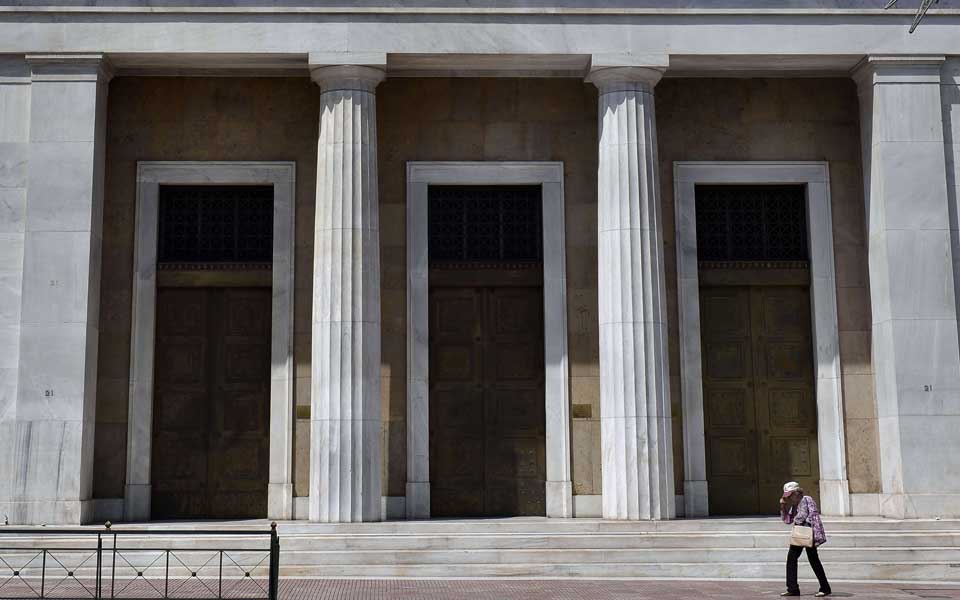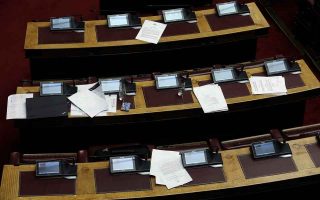Structural shortcomings keeping Greek recovery at bay

“It is a national and pressing necessity for us to formally ask our partners for the activation of the support mechanism, which we jointly created in the European Union.” Greeks are unlikely to forget the scene of George Papandreou standing in the springtime sun against the backdrop of Kastelorizo island’s picturesque harbor announcing the country’s recourse to its new creditors: the member-states of the eurozone, the European Central Bank and the International Monetary Fund. The date was April 23, 2010.
No one at the time could have imagined how long and painful the process would be and initial optimism for what turned out to be the first of three programs evaporated within the first few months. A lot of high-risk moves have been made since then, pushing the country to the brink. The capitulation of the leftist-led coalition government of SYRIZA and Independent Greeks in July 2015 and the signing of the third memorandum laid the specter of Grexit to rest, yet the much-desired return to normalcy remains elusive even today. Greece, as Germany’s former finance minister Wolfgang Schaeuble said in September 2012, is still a “special case.”
From the onset, there was doubt over whether the program would work. As a member of the eurozone, Greece could not devalue its currency and its debt had reached unmanageable proportions (after the revision, at 127 percent of gross domestic product at the end of 2009). At the IMF, high-ranking executives seeking to avoid a repeat of Argentina and wary of the size of the Fund’s contribution, insisted on debt restructuring as a condition for its participation. Their objections were brushed aside, however, by the Fund’s managing director at the time, Dominique Strauss-Kahn, who believed that participation in the Greek program was vital for the IMF itself – and also possibly for his own presidential ambitions in the French elections of 2012. The result was stringent fiscal targets: primary surpluses of 5.9 percent of GDP in 2014, 6 percent from 2015 and over 5 percent through 2020. Speaking to the Fund’s executive board on May 9, 2010, Brazil’s Paulo Nogueira Batista said the program “may be seen not as a rescue of Greece, which will have to undergo a wrenching adjustment, but as a bailout of Greece’s private debt holders, mainly European financial institutions.”
The summer brought some respite, followed by a positive first review and praise for then finance minister Giorgos Papaconstantinou at the IMF’s Spring Meetings. It was short-lived. A decision by French President Nicolas Sarkozy and German Chancellor Angela Merkel at the French port of Deauville in October 2010 for private creditor participation in future eurozone sovereign debt restructurings sparked a fresh crisis in the euro. Once Ireland also took recourse to the troika, the subject of a Greek debt writedown became the subject of discussion in early 2011.
In the 18 months that followed, Greece repeatedly found itself with its back to the wall. On the domestic front, public outrage grew against austerity. Supporters of the Indignant movement held sit-ins and protest rallies at Syntagma Square, besieged Parliament, lambasted MPs and tuned into the revolutionary rhetoric of SYRIZA’s future ministers. The medium-term fiscal program was ratified in late June, pushing Papandreou to the brink of resignation and sparking violent protests in downtown Athens. On the international front, an initial proposal for debt restructuring presented in July was dismissed (mainly by Berlin), leading to the more radical solution of a 50 percent write-off of privately held Greek debt (public sector involvement/PSI) in October 2011. That September, meanwhile, Greece’s new finance minister, Evangelos Venizelos, had received Schaeuble’s proposal for a Greek exit from the eurozone and rejected it without further discussion.
To the present
In the wake of the initial agreement for the PSI, Papandreou caused a storm by calling a referendum on the deal. His announcement prompted an immediate and terse response from Merkel and Sarkozy, who told him outright that any such referendum could only concern Greece’s future in the eurozone. The plebiscite was canceled and Papandreou resigned, to be replaced by interim prime minister Lucas Papademos. The year 2011 turned out to be the worst of the Greek crisis: Recession was above 9 percent and unemployment soared to more than 20 percent.
The first half of 2012 saw Greece in a deep crisis once more. Despite the successful conclusion of the PSI (about 97 percent of privately held Greek bonds took a 53.5 percent cut) and the signing of the second memorandum, general elections in May saw leftist SYRIZA climb to second place and the entry into Parliament of two extreme anti-bailout forces: the nationalist Independent Greeks and neo-Nazi Golden Dawn. Conservative New Democracy won by a narrow margin in the second round of voting in June, going on to form a government with PASOK and Democratic Left (DIMAR). The development held the fear of Grexit at bay – temporarily.
DIMAR left the tripartite coalition in the summer of 2013 in objection at the closure of state broadcaster ERT. Berlin, meanwhile, appeared unappeased by the primary surplus Greece achieved that year and refused to back a proposal for debt relief that could have changed the course of political events in Athens.
Prime Minister Antonis Samaras’s days were numbered following this rejection and a poor performance in European parliamentary elections, and his government collapsed in December 2014 after failing to muster the votes needed in Parliament for electing a new president.
The first six months of the SYRIZA-led government of Alexis Tsipras were the most perilous for Greece. With the eurozone bolstered against potential systemic shocks, the experimentations of the inexperienced prime minister and his finance chief Yanis Varoufakis strengthened Schaeuble’s line and brought Greece within a hair’s breadth of Grexit. Tsipras’s volte-face in July averted the worst-case scenario and his re-election in September 2015 ushered in the coalition’s “systemic” period, with fiscal overperformance, good relations with the European institutions and a return to positive growth territory. The rebound, however, has been lackluster, new jobs are badly paid and productivity remains low. The fiscal crisis is expected to assume dramatic dimensions – with serious consequences on the economy – as the country’s institutions are being eroded and the clientelist mentality in the public sector continues to prevail. Meanwhile, political polarization – one of the main factors contributing to Greece’s ills over the past eight years – is still very strong.
For these and other reasons, supervision by Greece’s creditors after August 20 will be much more stringent than in any other eurozone country that went through an adjustment program. The memorandums may be over, but Greece still has a long way to go before it returns to normality.





